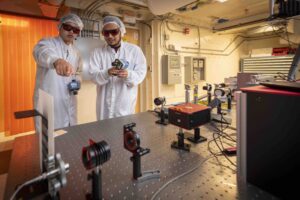
Left to right: Qiang Chen (MSIIP mentor), Bryan Alamillo (intern)
The National Nuclear Security Administration Minority Serving Institutions Internship Program (NNSA-MSIIP) provides paid internship opportunities for undergraduate and graduate students enrolled at Minority Serving Institutions. It offers summer or year-long internship opportunities with the national laboratories, NNSA, and site offices.
Qiang Chen, a research scientist at the Berkeley Lab Laser Accelerator (BELLA) Center in the Accelerator Technology & Applied Physics (ATAP) Division of the Physical Sciences Area, supported the first cohort at the Lab this past summer as a mentor. Plasma, which is a state of matter that enables next generation particle accelerators for nonproliferation, security, medical, and high-energy physics applications, must be tailored precisely. Anthony Gonsalves, associate director for experiments in the BELLA Center, had suggested to him that tailoring plasmas via precision control over ultrashort light pulses might be an exciting project for an MSIIP intern that could reinforce an NNSA project on high performance X-ray sources. Qiang looked into the opportunity and dove into the process, which included reviewing the CVs of potential candidates on the program’s website, identifying a few with suitable backgrounds, and interviewing them.
Qiang was impressed by Bryan Alamillo, a Cal State Channel Islands senior majoring in applied physics. Bryan’s school didn’t offer many internship opportunities for physics research, so when his advisor sent out an email about the MSIIP internship, he put his hat in the ring.
“I was inspired by Bryan’s enthusiasm,” said Qiang. “He demonstrated that he had read relevant background material and had prepared for the interview.”
In December 2022, Berkeley Lab offered Bryan an internship.. “I was surprised and thrilled when I was accepted by Berkeley Lab,” he said. “I could hardly contain my excitement throughout the spring.”
Once Bryan was on board, Qiang was impressed by his progress. “I had not worked with interns before,” said Qiang. “It was really enjoyable for me to watch Bryan grow over the course of the ten-week internship. He made huge strides learning about the science and contributing to our NNSA project as part of a team.”
Bryan agreed, “I learned so much; I was constantly learning new things. And I didn’t expect the scientists to be so helpful and collaborative and to care about each other’s work. I had many long discussions with my mentors about what we were working on. The experience taught me that I want to work in STEM and in a lab.”
Qiang encourages other scientists at the Lab to explore the MSIIP program and other internship programs at the Lab (Workforce Development & Education offers thirteen internship programs for undergraduates, post baccalaureates, graduate students and faculty.).
“Being at Berkeley Lab is not just about science; it’s also about how we can contribute to society,” said Qiang. “Precision X-ray sources that plasma based accelerators can create, on which Bryan worked, are a perfect example with potential to improve nonproliferation as well as medical and other applications.” This is part of broad Lab R&D in areas from detectors to accelerators, to high performance computing and machine learning.
As for Bryan, he is now back in school and working on completing his degree. How has the internship benefited him?
“It’s been a life-changing experience,” said Bryan. “I am the first in my family to go to college and didn’t have confidence in myself as a scientist. But all the support, encouragement, and training I got at Berkeley Lab was wonderful. This internship has improved my confidence and ability, and I am now more sure about what I want to do with my career.”
MSIIP Informational Webinars
Register for an informational session about the NNSA-MSIIP at 11-noon PST on one of the following dates:
September 28, 2023
October 5, 12, and 19, 2023
For more information about NNSA-MSIIP at Berkeley Lab, visit https://education.lbl.gov/nnsa-msiip/.
For information about internships at Berkeley Lab, visit the WD&E website.

